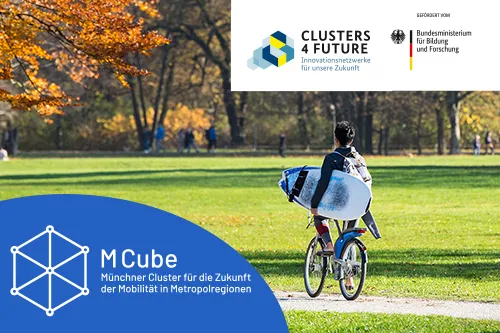The Munich Cluster for the Future of Mobility in Metropolitan Regions (M Cube), under the leadership of the Technical University of Munich (TUM), is among the winners of the German government’s Clusters4Future competition. M Cube will be launched in October 2021 and will receive up to 45 million euros in funding over a nine-year period. The regional network will bring together an interdisciplinary team of researchers along with partners from the private sector and civil society to work on the major challenges in the mobility sector.
Under the leadership of the TUM professors Markus Lienkamp (automotive engineering), Sebastian Pfotenhauer (innovation research) and Gebhard Wulfhorst (settlement structure and transport planning) and with broad support from professors, local industry and the public sector, the foundation stone is laid for a new phase of interdisciplinary, socially-oriented mobility research at TUM. “Mobility is a key topic for Munich and Germany, but also globally – this is where challenges to urban development and innovative strength meet issues of sustainability and social justice,” says Prof. Sebastian Pfotenhauer (MCTS / TUM School of Management). “For TUM, the Future Cluster Initiative is an opportunity to bundle its multifaceted research on mobility topics and to focus it specifically on questions of social responsibility.
M Cube represents an interdisciplinary research approach that bundles competencies along three main areas: Autonomous, shared, and electric driving; networking of multimodal mobility; integrated transport development at the neighborhood and regional level. The initiative pursues strategic goals with a view to economic, social, and ecological sustainability. The research in M Cube is, therefore, carried out in close cooperation between different disciplines and practical experts from companies and society. It enables model and scalable solutions that are co-creatively developed and tested in real laboratories. The aim is to address concrete social challenges (Fig. 1). The project takes up the breadth of mobility research at the TUM and works closely with strong project partners from the region, such as BMW, MAN, Deutsche Bahn, MVG/Stadtwerke München, the City of Munich and the Bavarian State Ministry of Housing, Construction and Transport.
